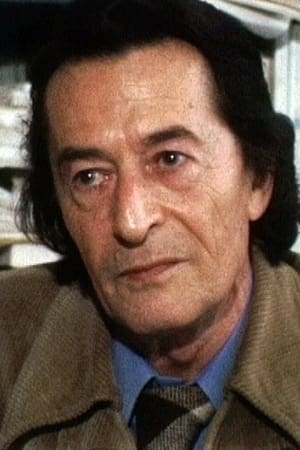Personal Info
Known For Acting
Known Credits 3
Gender Male
Birthday November 21, 1914
Day of Death May 18, 1995 (80 years old)
Place of Birth Hanoï, French Indochina [now Vietnam]
Also Known As
- -
Content Score
100
Yes! Looking good!
Login to report an issue
Biography
Henri Laborit (21 November 1914 – 18 May 1995) was a French surgeon, neurobiologist, writer and philosopher. In 1952, Laborit was instrumental in the development of the drug chlorpromazine, published his findings, and convinced three psychiatrists to test it on a patient, resulting in great success. Laborit was recognized for his work, but as a surgeon searching for an anesthetic, he came to be at odds with psychiatrists who made their own discoveries and competing claims.
Laborit wrote several books where he vulgarizes his ethological laboratory research and marries it, through systems thinking, with knowledge from several other disciplines, being a strong advocate of interdisciplinarity and transdisciplinarity. His writings can also be found to have deep roots in anarchist thought. He was personally untroubled by the requirements of science and the constraints of university life. He maintained an independence from academia and never sought to produce the orderly results that science requires of its adherents.
Henri Laborit was born in Hanoi, French Indochina, in 1914. His father was a physician and colonial officer who died in 1920 from tetanus. Laborit contracted tuberculosis at age 12. In Paris, he earned a baccalaureate. He spent two years in Indochina on a hospital ship. He passed the examinations at the Naval Health Service in Bordeaux, and became a navy physician. He was sent to Sidi Abdallah, Bizerte. Feeling that his options for recognition would be better, he switched to become a surgeon. During World War II he was stationed on the torpedo boat Sirocco, where he witnessed the evacuation of the Dunkerque, and then was sunk by the Germans. He was saved by an English sloop that picked him up. He received the French Military Cross with distinction. He was later stationed in Dakar. By about 1949 he was appointed to Val-de-Grâce hospital in Paris.
Laborit was the first to recognize the potential psychiatric uses of chlorpromazine. The science of anesthesiology was new since the 1930s. Surgeons were sometimes responsible for anesthetics and as a French navy surgeon, Laborit had seen patients die as a result of or after their operations. He became a researcher in anesthesiology. Laborit's ideas on anesthesia included potentiated anaesthesia, lowering basal metabolism and lowering body temperature (so-called artificial hibernation). He advocated the use of procaine, synthetic antihistamines, Diparcol (diethazine), tetraethylammonium bromide and vitamin B1. He did not like to use morphine. In his years in Bizerte he became interested in the use of the antihistamine promethazine to make patients more relaxed before surgery and in contributing to anesthesia, observations that were the forerunner of his later interest in chlorpromazine. ...
Source: Article "Henri Laborit" from Wikipedia in English, licensed under CC-BY-SA 3.0.
Henri Laborit (21 November 1914 – 18 May 1995) was a French surgeon, neurobiologist, writer and philosopher. In 1952, Laborit was instrumental in the development of the drug chlorpromazine, published his findings, and convinced three psychiatrists to test it on a patient, resulting in great success. Laborit was recognized for his work, but as a surgeon searching for an anesthetic, he came to be at odds with psychiatrists who made their own discoveries and competing claims.
Laborit wrote several books where he vulgarizes his ethological laboratory research and marries it, through systems thinking, with knowledge from several other disciplines, being a strong advocate of interdisciplinarity and transdisciplinarity. His writings can also be found to have deep roots in anarchist thought. He was personally untroubled by the requirements of science and the constraints of university life. He maintained an independence from academia and never sought to produce the orderly results that science requires of its adherents.
Henri Laborit was born in Hanoi, French Indochina, in 1914. His father was a physician and colonial officer who died in 1920 from tetanus. Laborit contracted tuberculosis at age 12. In Paris, he earned a baccalaureate. He spent two years in Indochina on a hospital ship. He passed the examinations at the Naval Health Service in Bordeaux, and became a navy physician. He was sent to Sidi Abdallah, Bizerte. Feeling that his options for recognition would be better, he switched to become a surgeon. During World War II he was stationed on the torpedo boat Sirocco, where he witnessed the evacuation of the Dunkerque, and then was sunk by the Germans. He was saved by an English sloop that picked him up. He received the French Military Cross with distinction. He was later stationed in Dakar. By about 1949 he was appointed to Val-de-Grâce hospital in Paris.
Laborit was the first to recognize the potential psychiatric uses of chlorpromazine. The science of anesthesiology was new since the 1930s. Surgeons were sometimes responsible for anesthetics and as a French navy surgeon, Laborit had seen patients die as a result of or after their operations. He became a researcher in anesthesiology. Laborit's ideas on anesthesia included potentiated anaesthesia, lowering basal metabolism and lowering body temperature (so-called artificial hibernation). He advocated the use of procaine, synthetic antihistamines, Diparcol (diethazine), tetraethylammonium bromide and vitamin B1. He did not like to use morphine. In his years in Bizerte he became interested in the use of the antihistamine promethazine to make patients more relaxed before surgery and in contributing to anesthesia, observations that were the forerunner of his later interest in chlorpromazine. ...
Source: Article "Henri Laborit" from Wikipedia in English, licensed under CC-BY-SA 3.0.
Acting
|
|||
|
|||
|
Writing
|
